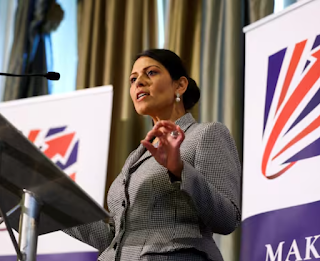Priti Patel's exit from the Conservative Party leadership race marks a significant moment in the contest to replace Rishi Sunak, with the former home secretary garnering only 14 votes in the first round. Despite being a prominent figure within the party, her limited support among fellow Tory MPs led to her early elimination. Patel's leadership bid was rooted in her experience as a senior cabinet minister and her personal story of growing up in a family-run shop, a background that shaped her pro-business stance. Her campaign emphasized the importance of holding Labour accountable for what she described as the risks posed by their higher taxes and expanding socialist policies. However, it failed to gain the momentum needed to keep her in the running.
Robert Jenrick, now the frontrunner with 28 votes, has positioned himself as the candidate capable of uniting the party around its core principles, while Kemi Badenoch, with 22 votes, has focused on delivering a message of renewal and reform. James Cleverly (21 votes) remains in a strong position, claiming that his campaign is gaining momentum, and Tom Tugendhat (17 votes) and Mel Stride (16 votes) continue to fight for a place in the next round of the contest. The results of the next round of voting, set for Tuesday, will further narrow the field as the candidates battle to reach the final stage at the Conservative Party conference later this month.
The eventual winner of the leadership contest will face the challenge of taking over from Sunak, who has been acting as the Opposition Leader since the party's defeat in the July 4 general election. The new leader will be tasked with uniting a party that has seen internal divisions and guiding the Conservatives through the next phase as they prepare for the general election.
For Patel, her elimination from the race marks a pause in her political ambitions, but her legacy within the party as a prominent figure of Gujarati heritage and her tough stance on immigration and law enforcement will remain. Her leadership pitch, focused on economic growth and accountability, reflects the broader ideological battle within the Conservative Party as it seeks to redefine itself in the face of changing political dynamics.



